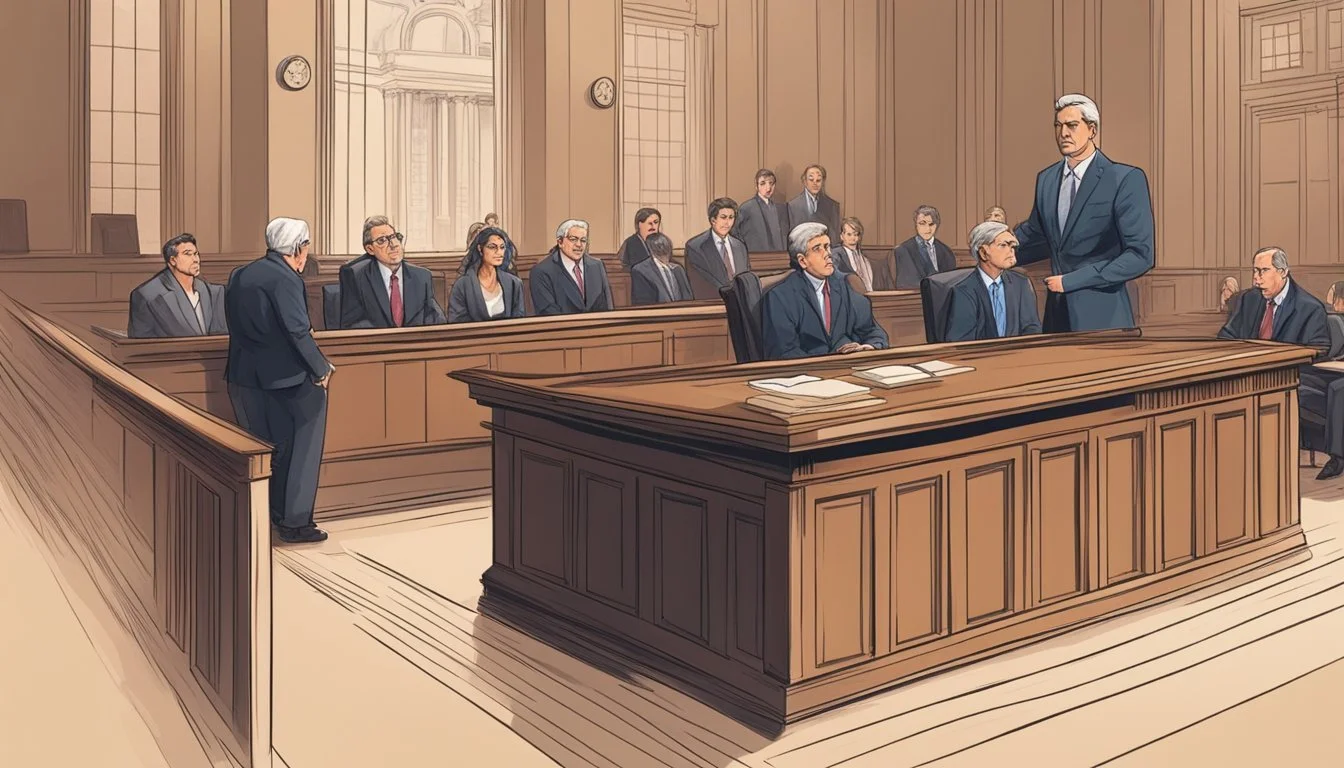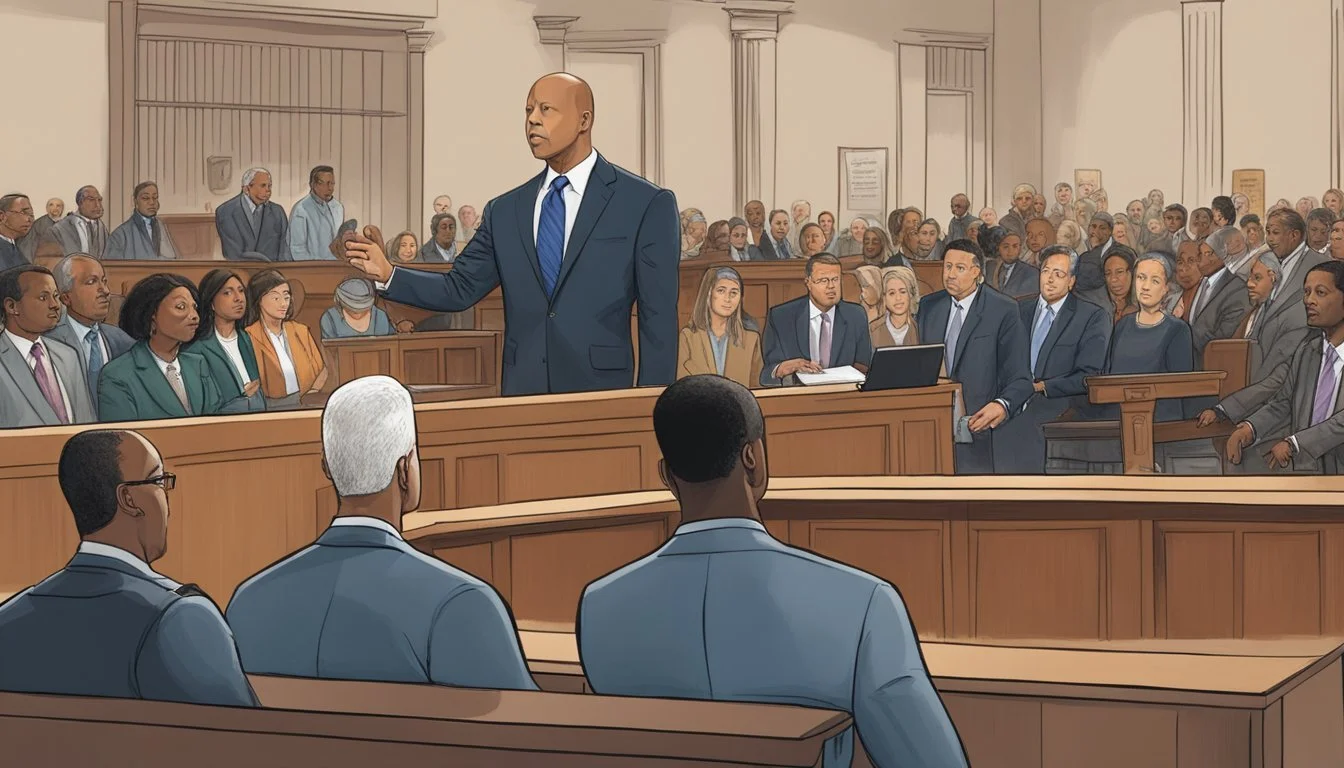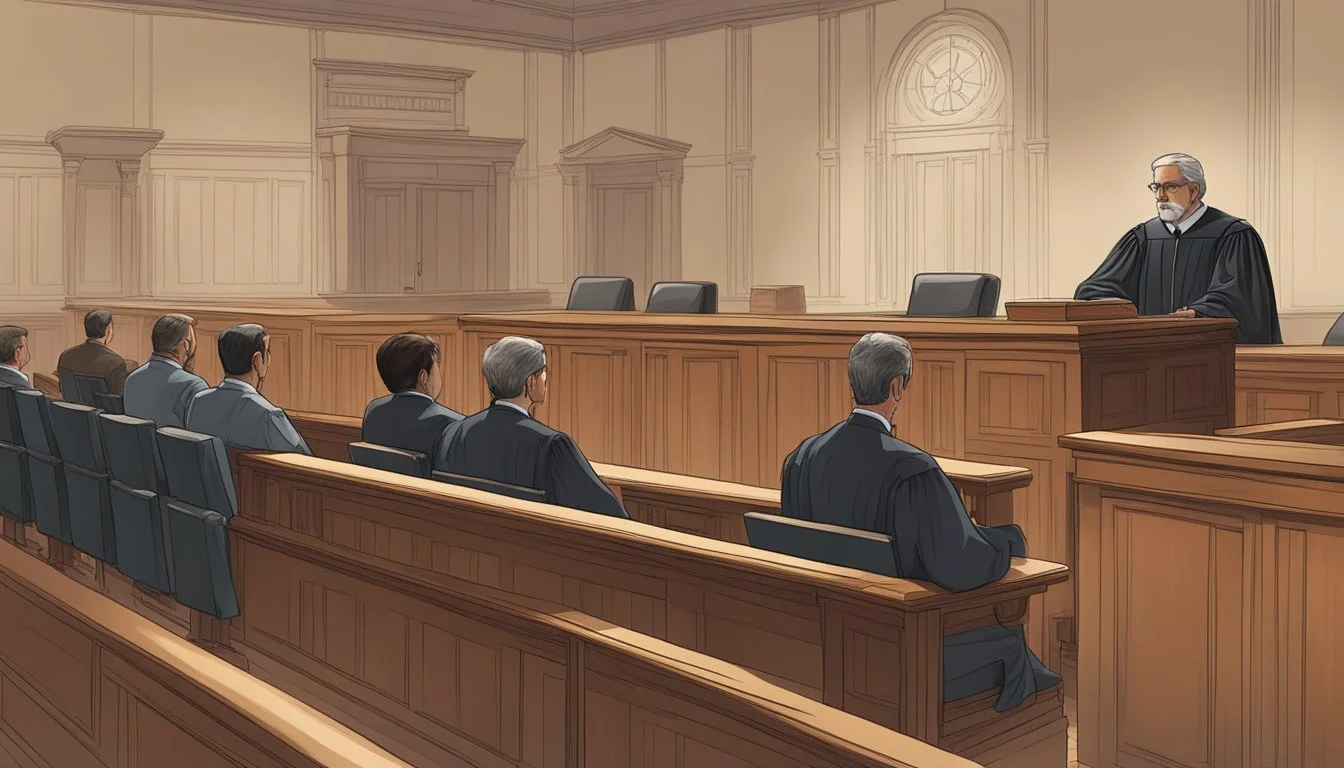Exposing Injustice: The Actual Events of Just Mercy
A Legal Battle for Truth
"Just Mercy" brings to light the disturbing realities of racial bias and inequality in the American criminal justice system. Based on true events, the film follows civil rights attorney Bryan Stevenson as he fights for justice for wrongfully convicted Black men on death row in Alabama. Through Stevenson's tireless efforts, the movie exposes systemic failures and challenges viewers to confront the harsh truths of a flawed legal system.
The story centers on Walter McMillian, a Black man sentenced to death for a murder he did not commit. Despite overwhelming evidence of his innocence, McMillian faced a system stacked against him from the start. Stevenson's legal battle to exonerate McMillian serves as a powerful lens through which audiences can examine the broader issues of racial discrimination and injustice permeating the courts.
By depicting real-life events, "Just Mercy" offers a sobering look at the human cost of prejudice and misconduct in law enforcement and the judiciary. The film's portrayal of Stevenson's work sheds light on the countless individuals who have suffered similar fates, emphasizing the ongoing need for reform and vigilance in the pursuit of equal justice under the law.
The Story of Walter McMillian
Walter McMillian, a Black man from Monroeville, Alabama, became the victim of a grave miscarriage of justice in the late 1980s. His case exemplifies the racial biases and flaws in the criminal justice system of that era.
False Accusations and Arrest
Walter McMillian was arrested in 1987 for the murder of Ronda Morrison, an 18-year-old white woman. Despite having a solid alibi, McMillian was targeted by law enforcement. On the day of the murder, he was at a fish fry with dozens of witnesses, including a police officer.
The accusation stemmed from Ralph Myers, a career criminal who initially implicated McMillian under pressure from the police. Myers later recanted his testimony, admitting he had never met McMillian before the trial.
Law enforcement ignored evidence pointing to McMillian's innocence and focused solely on building a case against him.
Trial and Conviction
McMillian's trial was marred by numerous irregularities and racial prejudices. The prosecution withheld exculpatory evidence and relied heavily on coerced testimony. The jury pool was predominantly white, despite the county's significant Black population.
Key facts of the trial:
Duration: 1.5 days
Jury composition: 11 white jurors, 1 Black juror
Verdict: Guilty, with a recommendation of life imprisonment
Judge's decision: Overruled jury, imposing the death penalty
McMillian spent nearly six years on death row before his conviction was overturned. Bryan Stevenson, a young attorney with the Equal Justice Initiative, took on McMillian's case and exposed the flaws in the original trial.
The Role of Bryan Stevenson
Bryan Stevenson played a pivotal role in fighting racial injustice within the U.S. criminal justice system. As a civil rights attorney, he dedicated his career to defending the wrongly convicted and advocating for equal justice.
Founding the Equal Justice Initiative
Stevenson founded the Equal Justice Initiative (EJI) as a young attorney. The organization focuses on providing legal representation to individuals who have been illegally convicted, unfairly sentenced, or abused in state jails and prisons.
EJI has won reversals, relief, or release for over 135 wrongly condemned prisoners on death row. The initiative also challenges excessive and unfair sentencing practices, assists formerly incarcerated people, and confronts racial and economic injustice.
Stevenson's work through EJI has brought national attention to systemic issues in the criminal justice system. He has argued several cases before the U.S. Supreme Court, securing important rulings on juvenile life sentences and other critical issues.
Challenges in Representing Walter McMillian
Walter McMillian's case was one of Stevenson's most significant and challenging. McMillian, a Black man, was wrongly convicted of murdering a white woman in Monroeville, Alabama.
Stevenson faced numerous obstacles in his efforts to prove McMillian's innocence. Local authorities were resistant to reopening the case, and key witnesses had been coerced into giving false testimony.
Despite these challenges, Stevenson persevered. He uncovered evidence that proved McMillian's alibi and exposed the racial bias that had influenced the trial. After years of legal battles, Stevenson successfully secured McMillian's release in 1993.
This case highlighted the systemic racism in the justice system and became a cornerstone of Stevenson's advocacy work. It demonstrated the critical importance of dedicated legal representation for disadvantaged defendants.
Legal and Racial Complexities
The criminal justice system in the United States faces deep-rooted issues of racial bias and systemic inequality. These problems are particularly evident in death penalty cases and in states like Alabama.
The Death Penalty and Racial Bias
Studies show that race plays a significant role in death penalty sentencing. Black defendants are more likely to receive capital punishment, especially when the victim is white. This disparity highlights the persistent racial bias in the justice system.
Prosecutors often seek the death penalty more frequently for Black defendants. Juries, which tend to have fewer minority members, may harbor unconscious biases that influence their decisions.
The exoneration rate for death row inmates is alarmingly high. For every nine executions, one person on death row is later found innocent and released. This statistic underscores the flaws in the capital punishment system.
Analysis of Alabama's Legal System
Alabama's legal system has faced criticism for its handling of criminal cases, especially those involving minority defendants. The state has a history of inadequate legal representation for poor defendants, many of whom are people of color.
Bryan Stevenson's work with the Equal Justice Initiative exposed numerous cases of wrongful convictions in Alabama. These cases often involved Black men who were denied proper legal counsel or faced biased juries.
Alabama's courts have been slow to address systemic issues. The state maintains a high execution rate despite concerns about fairness and accuracy in its criminal proceedings. Efforts to reform the system face significant political and cultural resistance.
Exoneration and Aftermath
Walter McMillian's case highlighted serious flaws in the Alabama justice system. His exoneration led to significant changes in legal procedures and public perceptions of capital punishment.
The Appeal Process
Bryan Stevenson and the Equal Justice Initiative took on McMillian's case in 1988. They uncovered evidence of witness coercion and prosecutorial misconduct. The defense team found that the state had suppressed exculpatory evidence.
Key witnesses recanted their testimonies, admitting they had been pressured by law enforcement. In 1993, the Alabama Court of Criminal Appeals overturned McMillian's conviction. The court ruled that the prosecution had withheld crucial evidence from the defense.
McMillian was released from death row after spending nearly six years there for a crime he did not commit. The charges against him were dismissed, and he was finally freed.
Impact on Community and Policy
McMillian's exoneration sparked outrage and calls for reform in Alabama and beyond. It exposed deep-rooted racial biases in the criminal justice system. The case became a rallying point for anti-death penalty advocates.
Several policy changes followed:
Increased scrutiny of death penalty cases
Improved protocols for handling exculpatory evidence
Enhanced training for prosecutors and law enforcement
The community in Monroeville, where the crime occurred, grappled with the aftermath. Many residents reassessed their beliefs about justice and race. McMillian's case inspired further investigations into other potentially wrongful convictions.
Bryan Stevenson's work on this case led to the founding of the Equal Justice Initiative. This organization continues to fight against racial injustice and excessive punishment in the legal system.
Broader Implications of the Case
The Walter McMillian case highlighted systemic issues in the criminal justice system and sparked discussions about racial bias and wrongful convictions. It exposed flaws in death penalty procedures and emphasized the need for reforms.
Civil Rights and Criminal Justice Reform
The case brought attention to racial disparities in the legal system. It revealed how prejudice and misconduct can lead to wrongful convictions, especially for people of color. The Equal Justice Initiative, founded by Bryan Stevenson, used this case to advocate for broader reforms.
Key areas of focus included:
Improving access to legal representation
Addressing prosecutorial misconduct
Reforming jury selection processes
Enhancing accountability in law enforcement
These efforts aimed to create a more equitable justice system and protect civil rights for all citizens.
Comparative Cases of Injustice
McMillian's case was not an isolated incident. Similar cases of wrongful convictions have been uncovered across the United States. The Innocence Project has helped exonerate hundreds of individuals through DNA testing and other means.
Some notable cases include:
Anthony Ray Hinton: Spent 30 years on death row in Alabama before exoneration
Rubin "Hurricane" Carter: Boxer wrongfully convicted of murder, later exonerated
Central Park Five: Teenagers wrongfully convicted in a high-profile New York City case
These cases share common themes of racial bias, coerced confessions, and flawed forensic evidence. They underscore the importance of continued vigilance and reform in the criminal justice system.
Media and Public Perception
Bryan Stevenson's work and the "Just Mercy" story have significantly influenced public perception of the criminal justice system. The media played a crucial role in spreading awareness about racial bias and inequality in the legal process.
Publication of 'Just Mercy'
Bryan Stevenson's memoir "Just Mercy" was published in 2014. The book quickly gained attention for its powerful storytelling and eye-opening accounts of injustice. It became a New York Times bestseller and was widely reviewed in major publications.
The memoir sparked important conversations about racial discrimination in the criminal justice system. Many readers were shocked by the stories of wrongful convictions and unfair treatment of defendants.
Stevenson's work received acclaim from legal experts, civil rights activists, and the general public. The book's success helped bring more attention to the Equal Justice Initiative, Stevenson's organization.
Adaptation to Film and Cultural Impact
In 2019, "Just Mercy" was adapted into a feature film starring Michael B. Jordan as Bryan Stevenson. The movie brought Stevenson's work to an even wider audience.
The film received positive reviews and was praised for its powerful performances. It helped visualize the injustices described in the book, making the issues more tangible for viewers.
"Just Mercy" was screened at law schools and universities across the country. These events often included discussions about racial bias in the legal system.
The movie's release coincided with increased public debate about criminal justice reform. It contributed to growing awareness of issues like wrongful convictions and racial disparities in sentencing.
Contemporary Reflections
The events portrayed in "Just Mercy" continue to resonate in today's society. Racial bias and inequality persist in the U.S. criminal justice system, highlighting the ongoing need for reform and advocacy.
Modern-Day Relevance
"Just Mercy" sheds light on issues that remain prevalent in 2024. Racial profiling, wrongful convictions, and disproportionate sentencing of people of color continue to plague the justice system.
The film has sparked discussions on systemic racism and the importance of legal representation for marginalized communities. Many law schools and universities now use "Just Mercy" as a teaching tool to examine racial injustice.
Social movements like Black Lives Matter have drawn parallels between historical cases and current incidents of police brutality and racial discrimination. This has led to increased scrutiny of law enforcement practices and calls for accountability.
Ongoing Challenges in the Justice System
Despite progress since the events depicted in "Just Mercy," significant hurdles remain in achieving equal justice. Racial disparities in arrests, convictions, and sentencing persist across the United States.
Key issues include:
Overrepresentation of minorities in prisons
Limited access to quality legal representation for low-income defendants
Bias in jury selection processes
Harsh sentencing laws that disproportionately affect people of color
Organizations like the Equal Justice Initiative continue to fight for reform. Their efforts focus on overturning wrongful convictions, challenging excessive punishments, and addressing racial bias in the courts.
Recent legislative efforts aim to address these issues, including sentencing reform and increased funding for public defenders. However, progress remains slow and uneven across different states and jurisdictions.






